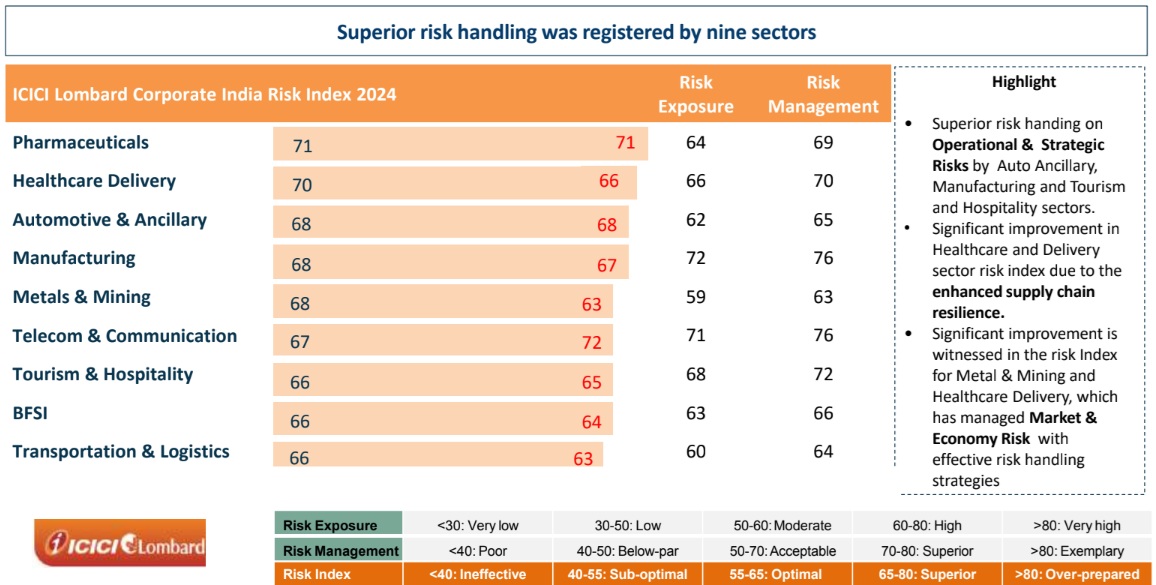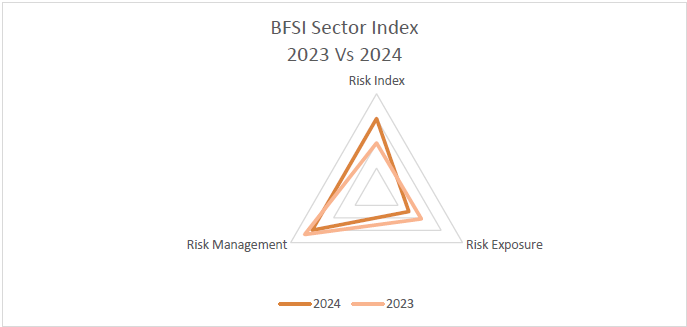ICICI Lombard CIRI 2024 Shows Corporate India Fortifies Risk Muscles: AI, Resilience Lead the Way; CIRI 2024 score improves to 65; AI emerges as both opportunity and threat across India Inc.

FinTech BizNews Service
Mumbai, May 8, 2025: Indian enterprises are not just surviving turbulence — they are building
systems to thrive in it. The fifth edition of the Corporate India Risk Index (CIRI) 2024, developed
by ICICI Lombard in partnership with Frost & Sullivan, reveals that corporate India has
sharpened its approach to risk with a CIRI score of 65 in 2024, up from 64 in 2023, signalling
optimized risk handling across sectors.
This uptick reflects a broader transformation in how businesses are responding to geopolitical
instability, economic slowdowns, AI disruption, and domestic uncertainty — including the lead-
up to national elections.

The key highlights for the BFSI sector:
Ø Digital Transformation & AI Integration:
The sector advanced its adoption of digital banking, AI, and blockchain technologies. These enabled enhanced customer experiences, fraud detection, and cost-efficient operations.
Ø Surge in Digital Payments:
Driven by government initiatives and consumer preference for contactless transactions, digital payment systems expanded rapidly, deepening India’s push toward a cashless economy.
Ø Economic & Market Volatility Risks:
Inflation, interest rate fluctuations, and global market instability created financial uncertainty. Institutions responded by reassessing portfolios and improving diversification strategies.
Ø Rising NPAs & Credit Risks:
Public sector banks faced increased non-performing assets, necessitating strengthened credit risk assessment and monitoring mechanisms.
Ø Tighter Regulatory Oversight:
Institutions navigated heightened scrutiny around data privacy, KYC norms, digital lending, and cybersecurity compliance, prompting significant infrastructure upgrades.
Ø Fintech & NBFC Competition Intensifies:
Startups and non-bank players captured niche markets with innovative offerings, forcing traditional players to accelerate digital and customer-centric innovation.
Ø Risk Index Trends (2024 vs 2023):
o Risk Index: 64 → 66 (increase)
o Risk Exposure: 64 → 63 (improved)
o Risk Management: 67 → 66 (slight decline)
Ø Focus on Financial Inclusion & Resilience:
Amidst regulatory and market challenges, the sector emphasized financial inclusion in rural areas and improved risk frameworks to strengthen overall resilience.
Sandeep Goradia – Chief Corporate Solutions, International, Bancassurance, ICICI
Lombard said, “This year’s findings clearly show that Indian companies are no longer reacting
to risk- they are managing their risks better. This progress is evident in the improvement
showcased by corporate India Risk Index. This upward trend, despite increasing challenges
demonstrate a proactive shift towards stronger risk mitigation frameworks. We are seeing a shift
toward long-term resilience, where AI, sustainability and digital agility are now foundational to
corporate strategy. At ICICI Lombard, we believe effective risk governance is not just a
compliance exercise- it is an enabler of sustained growth.”
In line with this shift, 2024 saw Indian corporates not just adapt, but excel across sectors, with
nine industries attaining ‘Superior Risk Index’ status. Companies across Pharmaceuticals,
Healthcare, BFSI, Manufacturing, embedded resilience into their core strategies, turning
volatility into an opportunity for transformation. AI adoption, cybersecurity fortification and
sustainability initiatives emerged as dominant themes shaping risk priorities. Even as external
pressures, from national elections to geopolitical unrest, tariff wars, global oil volatility,
intensified exposure levels, corporate India responded with more predictive, disciplined, and
future-focused risk management practices, driving a measurable improvement in overall
resilience.
Indicator 2024 2023
Corporate India Risk Index 65 64
Risk Management Index 68 67
Risk Exposure Index 65 64
Artificial Intelligence emerged as the most defining trend of 2024. From predictive analytics in
BFSI and manufacturing to AI-powered diagnostics in healthcare and autonomous systems in
automotive, companies leveraged AI to boost efficiency and foresight. Yet, this adoption also
introduced new vulnerabilities around data privacy, cybersecurity, and ethical governance.
Many sectors responded proactively, strengthening compliance frameworks and investing in AI-
specific risk mitigation.
“The evolution of India’s risk culture is not just visible — it is transformative,” said Mr. Aroop
Zutshi, Global President and Managing Partner, Frost & Sullivan. “We are seeing a
decisive shift from reactive risk management to proactive risk intelligence, where anticipation,
agility, and strategic foresight are now core to business resilience. Sectors such as
Pharmaceuticals, BFSI, and Manufacturing are leading this transition, embedding risk thinking
at the boardroom level and redefining resilience as a source of competitive advantage for India
Inc.”.
CIRI 2024 signals a profound shift in how Indian corporates approach risk — moving beyond
firefighting toward foresight. No longer content with responding to crises, companies are
embedding risk anticipation into the heart of their strategic playbooks. The steady rise in the
Risk Management Index reflects deeper board-level engagement, the strengthening of
governance frameworks, and a sharper focus on scenario-based planning. This evolution marks
a deliberate, strategic reimagining of resilience as a driver of sustained growth and long-term
competitiveness.